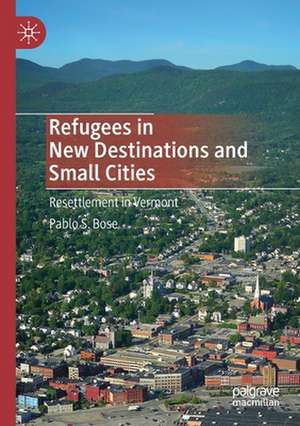Refugees in New Destinations and Small Cities: Resettlement in Vermont
Autor Pablo S. Boseen Limba Engleză Paperback – 17 sep 2021
| Toate formatele și edițiile | Preț | Express |
|---|---|---|
| Paperback (1) | 582.63 lei 6-8 săpt. | |
| Springer Nature Singapore – 17 sep 2021 | 582.63 lei 6-8 săpt. | |
| Hardback (1) | 586.70 lei 6-8 săpt. | |
| Springer Nature Singapore – 16 sep 2020 | 586.70 lei 6-8 săpt. |
Preț: 582.63 lei
Preț vechi: 685.45 lei
-15% Nou
Puncte Express: 874
Preț estimativ în valută:
111.49€ • 119.22$ • 92.96£
111.49€ • 119.22$ • 92.96£
Carte tipărită la comandă
Livrare economică 17 aprilie-01 mai
Preluare comenzi: 021 569.72.76
Specificații
ISBN-13: 9789811563881
ISBN-10: 9811563888
Pagini: 267
Ilustrații: XX, 267 p. 41 illus., 39 illus. in color.
Dimensiuni: 148 x 210 mm
Greutate: 0.38 kg
Ediția:1st ed. 2020
Editura: Springer Nature Singapore
Colecția Palgrave Macmillan
Locul publicării:Singapore, Singapore
ISBN-10: 9811563888
Pagini: 267
Ilustrații: XX, 267 p. 41 illus., 39 illus. in color.
Dimensiuni: 148 x 210 mm
Greutate: 0.38 kg
Ediția:1st ed. 2020
Editura: Springer Nature Singapore
Colecția Palgrave Macmillan
Locul publicării:Singapore, Singapore
Cuprins
Chapter 1: Introduction.- Chapter 2: The US and refugee resettlement.- Chapter 3: Immigration, refugees and Vermont.- Chapter 4: Burlington.- Chapter 5: Winooski.- Chapter 6: Rutland.- Chapter 7: Mobility.- Chapter 8: Food.- Chapter 9: Age.- Chapter 10: Conclusion.
Notă biografică
Pablo S. Bose studies migration and urban environments. His research is interdisciplinary in nature and his main focus over the past thirty years has been on refugees and resettlement in North America and Europe, on cities of the global south, and on environmental displacements across the world.
Textul de pe ultima copertă
‘From a politics of hospitality but also backlash to a nuanced analysis of cultural politics and the race question, Bose deftly examines refugee resettlement in Vermont in both local and global contexts. Refugee resettlement is usually an urban phenomenon. Newcomers’ narratives of arrival in the largely rural state of Vermont are juxtaposed with state officials and community leaders’ own experience of hosting refugees. The result is a fascinating, carefully researched portrait of cultural, racial, gendered and classed encounters.’
—Professor Jennifer Hyndman, Centre for Refugees Studies, York University
‘Refugees in New Destinations and Small Cities is about the experiences of resettled refugees in Vermont, but it is also a beautifully written in-depth exploration of immigrant integration in America. Pablo Bose’s passion and his own experience shine through, immersing us in the life of Vermont’s towns and the immigrants who keep them going.’
—Karen Jacobsen, Henry J. Leir Professor in Global Migration, Tufts University
For the last two decades, refugees, like other immigrants, have been settling in newer locations throughout the US and other countries. No longer are refugees to be found only in major metropolitan areas and gateway cities; instead, they are arriving in small towns, rural areas, rustbelt cities, and suburbs. What happens to them in these new destinations and what happens to the places that receive them? Drawing on a decade’s worth of interviews, surveys, spatial analysis and community-based projects with key informants, Dr Pablo Bose argues that the value of refugee newcomers to their new homes cannot be underestimated.
Pablo S. Bose studies migration and urban environments. His research is interdisciplinary in nature and his main focus over the past thirty years has been on refugees and resettlement in North America and Europe, on cities of the global south, and on environmental displacements across the world.
Caracteristici
Offers fresh perspectives on contemporary global migration policies and practices and how they play out at the local level Uniquely explores the lives of refugees in a region marked not by long histories of immigrant settlement (as in traditional destinations like New York, Chicago or San Francisco), but in a place undergoing significant demographic and cultural change Draws on extensive qualitative research with refugees, advocacy organizations, local and state officials, and various other stakeholder groups in order to understand not only the politics and history of resettlement, but also the lived realities of daily existence
